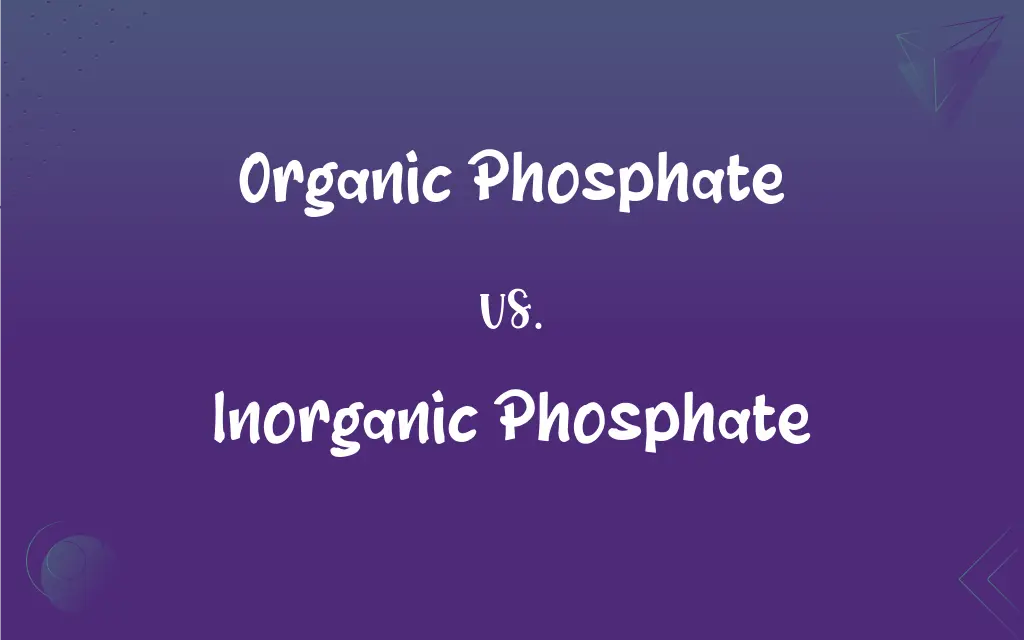Organic Phosphate vs. Inorganic Phosphate: What's the Difference?
Edited by Aimie Carlson || By Janet White || Published on January 4, 2024
Organic phosphates are phosphate groups bound to organic molecules, crucial in biochemistry, while inorganic phosphates are simple phosphate ions, key in geology and industry.

Key Differences
Organic Phosphate refers to phosphate groups bonded to organic compounds, playing vital roles in energy transfer in living organisms. Inorganic Phosphate, on the other hand, consists of simple phosphate ions, found in minerals and used in agriculture and industry.
Organic Phosphate is integral to biological molecules like ATP, which stores and transfers energy in cells. Inorganic Phosphate is often used as a fertilizer, contributing essential nutrients to soil for plant growth.
In biochemistry, Organic Phosphate compounds are involved in DNA and RNA structuring, forming the backbone of these essential molecules. Inorganic Phosphate, in its various forms, is used in detergents and cleaning agents due to its ability to soften water and remove dirt.
Organic Phosphate is typically found within living organisms and is a product of biological processes. In contrast, Inorganic Phosphate is sourced from phosphate rocks and is used in the production of phosphoric acid and other industrial chemicals.
The presence of Organic Phosphate is a sign of ongoing biological activity and is crucial in cell signaling and metabolism. Inorganic Phosphate, however, is more stable and persists in the environment, contributing to geological and aquatic ecosystems.
ADVERTISEMENT
Comparison Chart
Chemical Structure
Phosphate group bonded to organic molecules
Simple phosphate ions (PO4³⁻)
Role in Biology
Crucial in energy transfer, DNA/RNA structure
Not directly involved in biological processes
Common Uses
Integral in cellular functions and biochemistry
Used in fertilizers, detergents, and industrial chemicals
Source and Occurrence
Produced by living organisms
Found in mineral deposits, used in agriculture and industry
Environmental Impact
Essential for life processes, biodegradable
Can contribute to environmental issues like eutrophication
ADVERTISEMENT
Organic Phosphate and Inorganic Phosphate Definitions
Organic Phosphate
Involved in biochemical energy storage and release.
The organic phosphate in ADP releases energy when converted to ATP.
Inorganic Phosphate
Inorganic phosphate is used in the production of phosphoric acid.
Inorganic phosphate from mineral sources is processed to produce phosphoric acid for industrial applications.
Organic Phosphate
Organic phosphates are biodegradable and part of natural biological cycles.
Organic phosphates in decaying plant matter are recycled in the ecosystem.
Inorganic Phosphate
Used in detergents and cleaning agents for its water-softening properties.
Inorganic phosphate is added to detergents to improve their cleaning efficiency.
Organic Phosphate
A phosphate group attached to an organic molecule.
ATP, an organic phosphate, is essential for energy transfer in cells.
Inorganic Phosphate
Found in natural mineral deposits and used in industry.
Phosphate rock, a source of inorganic phosphate, is mined for industrial use.
Organic Phosphate
Organic phosphates are key components of DNA and RNA.
The backbone of DNA consists of a sugar-phosphate chain, an example of organic phosphate.
Inorganic Phosphate
It plays a role in environmental phenomena like eutrophication.
Excessive inorganic phosphate in water bodies can lead to algae blooms and eutrophication.
Organic Phosphate
Integral in cellular signaling and metabolism.
Cyclic AMP, an organic phosphate, plays a role in hormone signaling.
Inorganic Phosphate
Inorganic phosphate is a simple phosphate ion, often used in agriculture.
Inorganic phosphate is added to soil as a part of fertilizers to enhance plant growth.
FAQs
Can inorganic phosphate be converted to organic phosphate?
Yes, plants and microorganisms can convert inorganic to organic phosphate.
Why is organic phosphate important in living organisms?
It's crucial for energy transfer, DNA/RNA structure, and cellular signaling.
What is the primary difference between organic and inorganic phosphate?
Organic phosphate is bound to organic compounds, whereas inorganic phosphate exists as simple ions.
What are the common uses of inorganic phosphate?
It's used in fertilizers, industrial chemicals, and cleaning agents.
How does inorganic phosphate contribute to eutrophication?
It can lead to excessive algae growth in water bodies when present in high concentrations.
Can inorganic phosphate be synthesized in the lab?
Yes, it can be chemically synthesized for various applications.
Is organic phosphate harmful to the environment?
Generally, it's not harmful and is a part of natural biological cycles.
What role does organic phosphate play in energy metabolism?
It's involved in storing and releasing energy in cellular processes.
Does the body store inorganic phosphate?
Yes, it's stored in bones and plays a role in various bodily functions.
Are there health concerns associated with inorganic phosphate?
Excessive intake, particularly from processed foods, can be a health concern.
Can inorganic phosphate be naturally found in soil?
Yes, it's naturally present in soil but often in limited quantities.
Is organic phosphate used in any industrial applications?
Its use is mainly limited to biological and medical fields.
How is inorganic phosphate mined?
It's extracted from phosphate rock in large-scale mining operations.
What is the impact of excessive use of inorganic phosphate fertilizers?
It can lead to soil degradation and environmental pollution.
Do animals produce organic phosphate?
Yes, animals produce it as part of normal metabolic processes.
Can inorganic phosphate be found in water bodies?
Yes, it's often present in water, either naturally or from pollution.
How do plants use inorganic phosphate?
Plants absorb it from the soil and convert it into organic phosphate for growth.
What happens to organic phosphate after its biological use?
It's often broken down and recycled in natural ecosystems.
Is there a dietary requirement for organic phosphate?
Indirectly, as it's necessary for the body to perform vital functions.
How are organic and inorganic phosphates detected and measured?
They are measured using various chemical and biological assays in laboratories.
About Author
Written by
Janet WhiteJanet White has been an esteemed writer and blogger for Difference Wiki. Holding a Master's degree in Science and Medical Journalism from the prestigious Boston University, she has consistently demonstrated her expertise and passion for her field. When she's not immersed in her work, Janet relishes her time exercising, delving into a good book, and cherishing moments with friends and family.
Edited by
Aimie CarlsonAimie Carlson, holding a master's degree in English literature, is a fervent English language enthusiast. She lends her writing talents to Difference Wiki, a prominent website that specializes in comparisons, offering readers insightful analyses that both captivate and inform.






































































